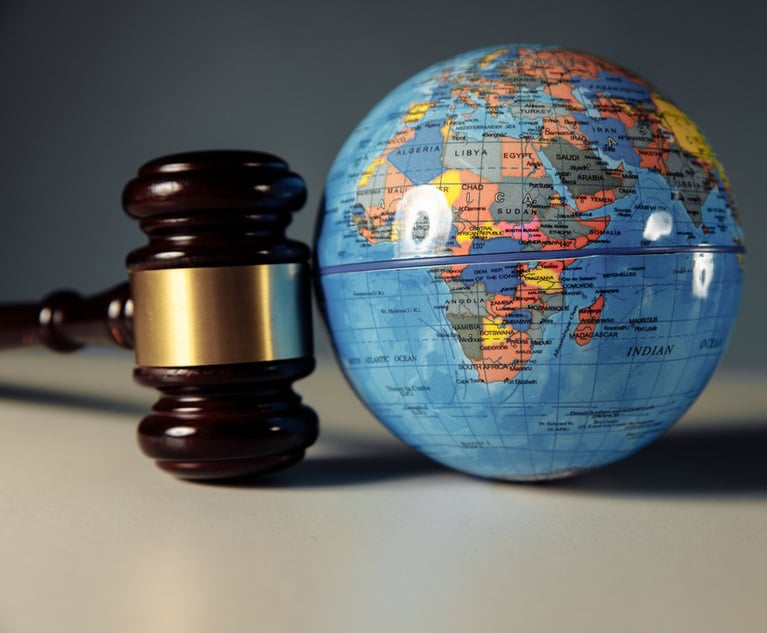 People in railway station of western Ukrainian city of Lviv waiting for the train to Poland, Lviv, Ukraine – February 26, 2022. Credit: Bumble Dee/Shutterstock.com
People in railway station of western Ukrainian city of Lviv waiting for the train to Poland, Lviv, Ukraine – February 26, 2022. Credit: Bumble Dee/Shutterstock.com Hold Russia Accountable For War Crimes
As lawyers, we add our voice to those who seek to hold Russia accountable not just in the court of public opinion but as a matter of law.
March 20, 2022 at 10:00 AM
4 minute read
Like everyone else, we are shocked and appalled by the war in Ukraine, and concerned about the course the United States should take. We are all still reeling from the shock that the unimaginable is now reality.
As lawyers, we add our voice to those who seek to hold Russia accountable not just in the court of public opinion but as a matter of law. With the bombing of children's hospitals and other atrocities against civilians, Russia has brought itself within Paragraph 139 of the 2005 World Summit Outcome resolution A/60/L.1, acknowledging the responsibility of the international community through the United Nations "to use appropriate diplomatic, humanitarian and other peaceful means" per the U.N. Charter "to help to protect populations from genocide, war crimes, ethnic cleansing and crimes against humanity." This document sets out the norm of the "Responsibility to Protect (R2P). This norm provides a basis for action of the Security Council. While permanent members of the Security Council still include Russia (which has its veto power), the American Bar Association this year has gone on record endorsing self-restraint by permanent members in exercising that veto power where credible, non-pretextual claims are made of war crimes, genocide and crimes against humanity. While no one is naïve enough to expect Russia to restrain itself when its own actions are involved, the ABA resolution, together with R2P, provides a basis for an international legal position with regard to Russian acts. At some point, current Russian leadership will change, and new Russian leadership will need to address its economic, political and legal isolation in the world community. The rule of law is not irrelevant to that.
This content has been archived. It is available through our partners, LexisNexis® and Bloomberg Law.
To view this content, please continue to their sites.
Not a Lexis Subscriber?
Subscribe Now
Not a Bloomberg Law Subscriber?
Subscribe Now
NOT FOR REPRINT
© 2025 ALM Global, LLC, All Rights Reserved. Request academic re-use from www.copyright.com. All other uses, submit a request to [email protected]. For more information visit Asset & Logo Licensing.
You Might Like
View All
As Trafficking, Hate Crimes Rise in NJ, State's Federal Delegation Must Weigh in On New UN Proposal
4 minute read

Some Think New Jersey Could Be a Hub for International Dispute Resolution
4 minute read
Must the Government Ensure Defendants Equal Access to Overseas Evidence?
9 minute readTrending Stories
- 1Stevens & Lee Names New Delaware Shareholder
- 2U.S. Supreme Court Denies Trump Effort to Halt Sentencing
- 3From CLO to President: Kevin Boon Takes the Helm at Mysten Labs
- 4How Law Schools Fared on California's July 2024 Bar Exam
- 5'Discordant Dots': Why Phila. Zantac Judge Rejected Bid for His Recusal
Who Got The Work
Michael G. Bongiorno, Andrew Scott Dulberg and Elizabeth E. Driscoll from Wilmer Cutler Pickering Hale and Dorr have stepped in to represent Symbotic Inc., an A.I.-enabled technology platform that focuses on increasing supply chain efficiency, and other defendants in a pending shareholder derivative lawsuit. The case, filed Oct. 2 in Massachusetts District Court by the Brown Law Firm on behalf of Stephen Austen, accuses certain officers and directors of misleading investors in regard to Symbotic's potential for margin growth by failing to disclose that the company was not equipped to timely deploy its systems or manage expenses through project delays. The case, assigned to U.S. District Judge Nathaniel M. Gorton, is 1:24-cv-12522, Austen v. Cohen et al.
Who Got The Work
Edmund Polubinski and Marie Killmond of Davis Polk & Wardwell have entered appearances for data platform software development company MongoDB and other defendants in a pending shareholder derivative lawsuit. The action, filed Oct. 7 in New York Southern District Court by the Brown Law Firm, accuses the company's directors and/or officers of falsely expressing confidence in the company’s restructuring of its sales incentive plan and downplaying the severity of decreases in its upfront commitments. The case is 1:24-cv-07594, Roy v. Ittycheria et al.
Who Got The Work
Amy O. Bruchs and Kurt F. Ellison of Michael Best & Friedrich have entered appearances for Epic Systems Corp. in a pending employment discrimination lawsuit. The suit was filed Sept. 7 in Wisconsin Western District Court by Levine Eisberner LLC and Siri & Glimstad on behalf of a project manager who claims that he was wrongfully terminated after applying for a religious exemption to the defendant's COVID-19 vaccine mandate. The case, assigned to U.S. Magistrate Judge Anita Marie Boor, is 3:24-cv-00630, Secker, Nathan v. Epic Systems Corporation.
Who Got The Work
David X. Sullivan, Thomas J. Finn and Gregory A. Hall from McCarter & English have entered appearances for Sunrun Installation Services in a pending civil rights lawsuit. The complaint was filed Sept. 4 in Connecticut District Court by attorney Robert M. Berke on behalf of former employee George Edward Steins, who was arrested and charged with employing an unregistered home improvement salesperson. The complaint alleges that had Sunrun informed the Connecticut Department of Consumer Protection that the plaintiff's employment had ended in 2017 and that he no longer held Sunrun's home improvement contractor license, he would not have been hit with charges, which were dismissed in May 2024. The case, assigned to U.S. District Judge Jeffrey A. Meyer, is 3:24-cv-01423, Steins v. Sunrun, Inc. et al.
Who Got The Work
Greenberg Traurig shareholder Joshua L. Raskin has entered an appearance for boohoo.com UK Ltd. in a pending patent infringement lawsuit. The suit, filed Sept. 3 in Texas Eastern District Court by Rozier Hardt McDonough on behalf of Alto Dynamics, asserts five patents related to an online shopping platform. The case, assigned to U.S. District Judge Rodney Gilstrap, is 2:24-cv-00719, Alto Dynamics, LLC v. boohoo.com UK Limited.
Featured Firms
Law Offices of Gary Martin Hays & Associates, P.C.
(470) 294-1674
Law Offices of Mark E. Salomone
(857) 444-6468
Smith & Hassler
(713) 739-1250






